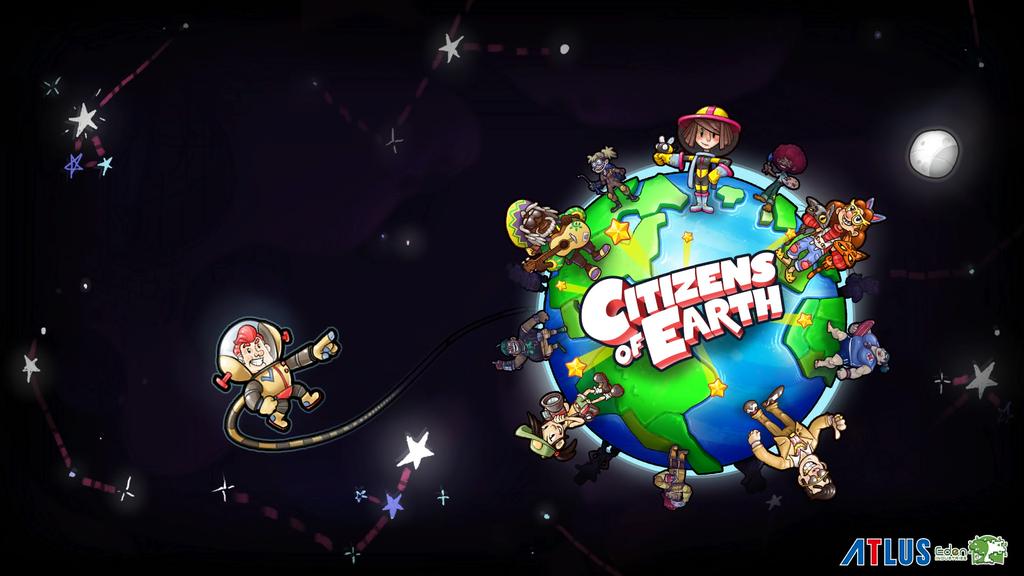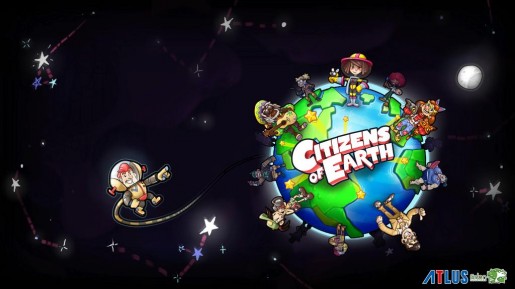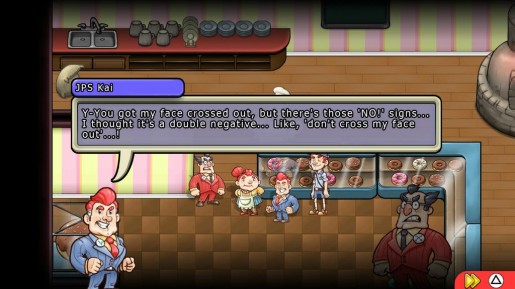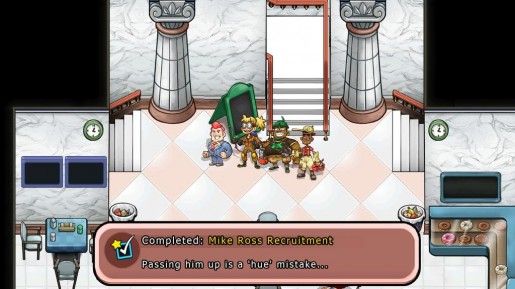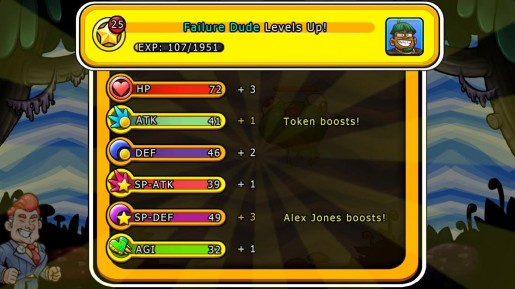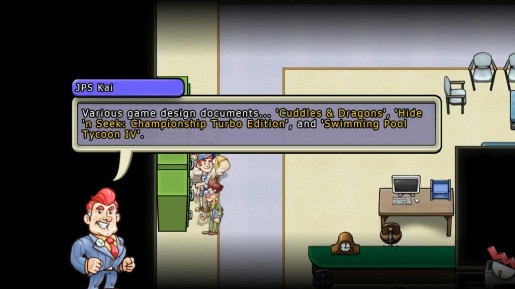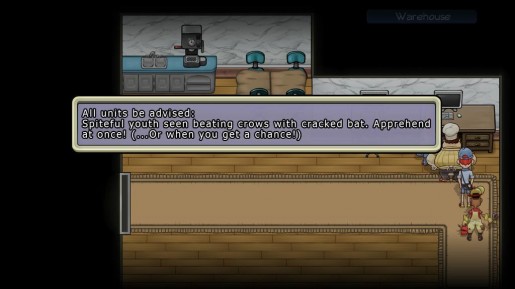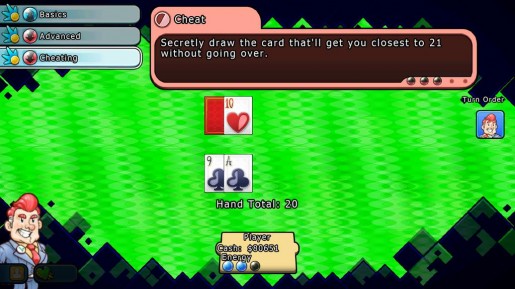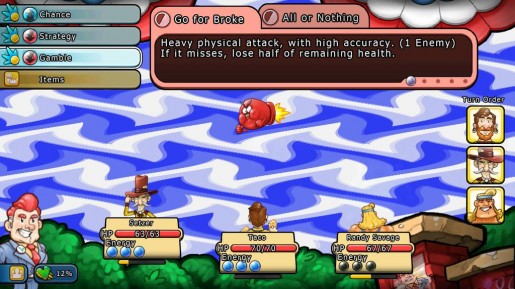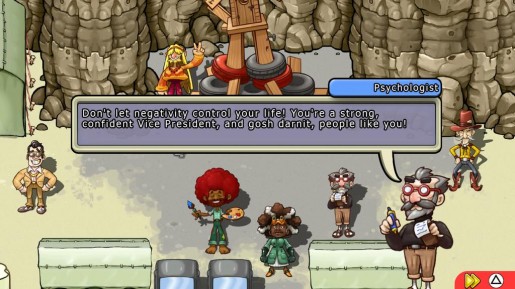There was a time in gaming when nearly any conceivable idea for a game would be considered fresh and there was no such thing as paying homage yet. Clones were commonplace in the industry. With the success of Super Mario Brothers came titles like Giana Sisters before disappearing into the nostalgic sunset. Now, more games than ever seem to not only pay tribute but base themselves around the core conventions that make a particular game unique. Citizens of Earth tries to find a happy medium between tribute and clone with its own unique style, but is it in need of a recount?
Citizens of Earth opens with the player stepping into the role of the newly elected Vice-President of Earth and his duties as second in command of the modern world. The first order of business? Protesters on his front lawn and a quest to secure some highly addictive coffee from the local Moonbucks. Much of the story revolves around mundane everyday tasks that feel endearing in their own way while not feeling too much of a grand scale plan to save the Earth from destruction (maybe that comes later).
True to the name of Citizens of Earth, those are the party members you’ll bring with you into combat. While the figurehead of the game is Earth’s VP, he’s not too good in any sort of combat himself. Instead, you’ll be recruiting forty different classes of citizens to protect the world from space cows or cats made out of cacti. Each class has a unique little quest they have to undertake before they willingly join your party. Some are fairly straight forward whereas others have some obtuse fetch quests or quirks you have to take care of before they’re willing to join your cause. Despite clearing just about everything in the game, I still have not deciphered exactly what is required to convince the local Pharmacist to join my cause.
Each citizen offers different abilities to combat and you’re free to choose which ever three you like to bring into combat at a given time. Some are naturally better suited to basic attacks every turn, some have healing or buffing tendencies, and others can bring out unique effects mid-battle. Rather than being limited by MP or some other consumable resource, characters generate and use Energy to bring out their attacks. Abilities are sorted by two categories: ones that increase Energy and those that decrease Energy. The former are typically basic attacks although there are a number of characters that solely have abilities that bolster stats or some other beneficial effect without necessarily dealing damage. On the other hand, energy-consuming abilities tend to lean towards the stronger heals or revives or elemental-focused attacks. Most characters align themselves with only a couple of elements, so it is handy to keep a fairly leveled group of citizens on the bench in case you need to swap out to someone that is an expert with verbal or flame type attacks, for example.
Team synergy is another important focus when it comes to leveling up. In addition to their own stats that they receive upon leveling up, each character can also confer an extra stat point to their team members whenever they level up. The sushi chef you acquire mid-way through Citizens of Earth is one of the only characters that can permanently increase a team member’s agility, so it’s handy to switch him in when a character’s close to leveling if you think they’re lagging behind in turn order. For a while, I was running with three different characters that all increased physical attack, so before long my primary citizens had more than enough damage to knock out basic foes in only one or two turns without much effort.
Each citizen also has a special talent that can be leveled up just with bringing them into battle. These talents are citizen-specific and can change the game in dramatic ways. Short on healing items? Call up your Delivery Driver brother and have him place an order for more donuts and coffee. Tired of walking everywhere? Recruit the Car Salesman and have him loan you a car to cruise between towns with ease. Finding combat to be too difficult or menial? The School Mascot has the ability to drastically change the difficulty of combat and with it, the rewards you gain post-battle.
The similarities between EarthBound and Citizens of Earth are more than just present in the combat presentation. Much of the dialogue and scenario situations share a similar sort of humor between the two with frequent one-off gags that seem a little on the nose when compared to the rest of the dialogue.
Citizens of Earth‘s art style can best be described as a cheerful comic book. Nearly everyone in the cast is all smiles, even when they’re being slapped around by a clairvoyant clam. The whimsical nature of the character designs is quite fitting for the easy going style of game Eden Industries has tried going for. Eden also experiments with unique uses for the battle system, including the casino scene above. At one point, there’s a street race out in the desert between the VP and the car salesman to recruit him culminating in a multi-lap track race. To give the VP’s car extra speed boosts, he has to defeat rival cars in a side battle and uses the energy he gains to power his speed boosts on the race track.
Where Citizens of Earth seems to fall behind is on its technical side of things. A lack of a world map makes memorizing which zones connect to which rather important and can lead to wandering around aimlessly to try and discover the next objective. There were a handful of times when my progression would be blocked, either by key events not starting up, getting trapped in corners or outside the map with no discernible exit, or even soft locking the entire game and forcing a quick reboot. These troubles only happened a small number of times during my full playthrough and never rolled back more than five minutes or so thanks to a generous autosave system.
Another anomaly was how unintentionally easy it was to sequence break the game. Through use of the psychiatrist’s dream walk or programmer’s ability to enter cyberspace and travel freely, I was able to get to areas that I otherwise wouldn’t until much later in the game with the proper citizens and abilities. For those looking to speedrun this game, that could be seen as a positive in its favor, otherwise it simply made trying to follow the story beats and get back to where I was supposed to a pain given the amount of backtracking had to be done just to trigger the next chapter.
Citizens of Earth ultimately is a light-hearted throwback to the days when EarthBound was still fresh in my heart. Aside from the few technical bugs that made me lose a couple hours of wandering about and get back on track, I enjoyed every minute of this twenty-some hour experience.
[Editor’s Note: Citizens of Earth was reviewed on the PlayStation 4 platform. Review code was provided to us by ATLUS.]

